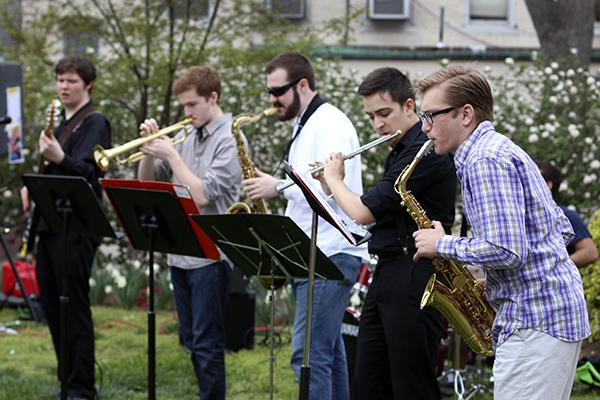Updated: April 27, 2015 at 12:19 p.m.
Music groups will see more Student Association funding next academic year, a move SA leaders say comes in response to recent music department budget cuts.
The SA Senate’s finance committee increased funding by at least 38 percent to student organizations connected to the music department, a month after University officials shrunk the department by almost half. Now, the student funds will help groups like the GW Orchestra and GW Jazz Orchestra pay for instructors, sheet music and CDs they produce.
The financial boost is one of the more prominent acts of student support for GW’s music programs after the cuts and follows a month of student-organized protests, including a 16-hour-long concert and a social media campaign.
The GW Troubadours, an a cappella group affiliated with the music department, saw its funding jump by more than 400 percent to about $1,890, and GW’s orchestra, which did not receive funding last year, will likely have $500 to spend after allocations are approved by the SA Senate on Monday night.

And GW’s jazz orchestra, which also did not receive any funding from the SA last year, will have $2,200 to spend starting next semester, according to SA allocation data.
Nancy Mannebach, who will lead the finance committee next semester, said music groups asked for more money this year than they have in the past so they could afford to bring in instructors for rehearsals and pay for sheet music.
Mannebach said some groups are asking for support because GW used to fund items like vocal coaches, but that money was lost in the budget cuts.
The finance committee distributes $1.2 million to student organizations each year, giving out funds after groups submit tentative budgets to the group in April.
Mannebach said the committee had decided to increase those groups’ allocations because the organizations needed the dollars to create CDs and bring in instructors, essential components to their work.
“We heard the news of how it’s affected so many students and different professors, so we gave them more money,” Mannebach said, adding that the finance committee would likely not be able to fund the groups to the same extent next year.
Ben Pryde, the current chair of the senate’s finance committee, said increasing the funding would help students who were majoring or minoring in music programs but wanted to participate in more outside instruction.
“It’s important that we’re funding these organizations,” Pryde said. “What they bought into when they were freshmen is what they should be receiving.”

He added that giving extra funds to the music groups wouldn’t have an impact on funding for other student organizations, because the demand student organizations have for the $1.2 million the finance committee gives out fluctuates each year.
“Because the school was pulling back on some music programs, we did choose to fund some items or activities that the school has historically funded,” Pryde said.
Rayhaan Merani, a freshman senator who also sat on the finance committee, said the SA made the decision to “step up to the plate” and help make up for the lack of departmental financial support. He called GW’s music groups “influential” and said he hoped to see them continue.
“Are we going to the hold the University accountable and ask them for money, or are we going to let the student experience deteriorate?” he said.
Students learned of the cuts to the music department in March, when GW announced that the department would be downsized to one band and one chorus and limit teaching to students majoring and minoring within the department.
Jack Rametta, the treasurer of GW Jazz Orchestra, said members of the organization have been “very concerned” about the budget cuts.
“We think that efforts made by the SA to compensate for departmental budget cuts are arguably a good thing, and something that we might support individually,” he said in a statement.
Barbro Dahlman, a professor in the music department, said any support from the SA to fund music-based student organizations can help “enrich” the programs.
She said any extra support students can receive for their extracurricular music programming can only help.
“They’re not doing it for credit, they’re doing it because they want to do it,” Dahlman said. “This adds a huge amount of vibrancy to the whole department.”
James Levy, a music professor who started the department’s jazz jam session – a 30-year-old institution that held its last performance Friday – said he’s “conflicted” about the surge in funding because he’s afraid that the increased SA funding will deter the University from giving more funding to department in the future.
“It’s supposed to be a synergy between academic people modeling behavior for students and students going off and doing their own things,” he said. “I think it’s great that the SA is coming up with money to make up for this, but the University shouldn’t be making these cuts in the first place.”
This post was updated to reflect the following clarification:
A photo caption was updated to clarify that the Latin Band participated in the 16-hour music department protest, but is not a student organization.







